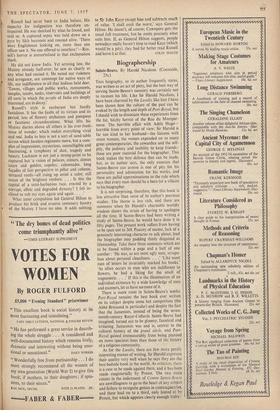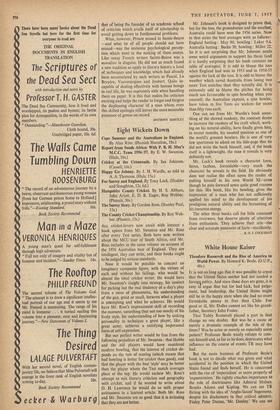Biographership
Tuns biography, so its author frequently states, was written as an act of piety, but the best way of serving Sainte-Beuve's memory was certainly not to recount his life. Like Sir Harold Nicolson, 1 have been charmed by the Lundis, like him I have been shown how the culture of the past can be evoked by the length and depth of Port-Royal, but I should wish to dissociate these experiences from the fat, bitchy hermit of the Rue du Montpar- nasse. The horrible affair with Adele Hugo--.– horrible from every point of view; Sir Harold is far too kind to her husband—the liaisons with street women, the venom expended on so many great contemporaries, the cowardice and the self- pity, the jealousy and inability to keep friends : these are poor material for the biographer. This book makes the best defence that can be made, but, as its author says, the only emotion that Sainte-Beuve can arouse is one of pity for his personality and admiration for his works, and these are pallid approximations to the rule which says that every man should be a hero (or a villain) to his biographer.
It is not surprising, therefore, that this book is less attractive than some of its author's previous studies. The theme is less rich, and there are moments when Sir Harold's charitable worldly wisdom shows the strain of having to apologise all the time. If Sainte-Beuve had been writing a study of Sainte-Beuve, he would have done it in fifty pages. The present work suffers from having to be spun out to 268. Paucity of matter, lack of a genuinely interesting character to talk about, lead the biographer into padding thinly disguised as lifemanship. Take these three sentences which are to be found within a page and a half of one another : 'He was, as are most ugly men, scrupu- lous about personal cleanliness. . . ."Like most men of letters he invariably marked his books.' 'As often occurs to men who are indifferent to flowers, he had a liking for the smell of Mignonette. . . If this is the illumination of an individual existence by a wide knowledge of men and manners, let us have no more of it.
There is more meat in Sainte-Beuve's works. Port-Royal remains the best book ever written on its subject despite some hot competition (the Abbe Bremond in particular) and despite the fact that the Jansenists, instead of being the seven- teenth-century Royer-Collards Sainte-Beuve had imagined, turned out to be gloomy, fanatical and irritating. Jansenism was and is, central to the cultural history of the grand siecle, and Port- Royal gained immeasurably from being planned on more spacious lines than those of the history of a religious community.
As for the Lundis, there are few more purely interesting masses of writing. Sir Harold expresses their quality very well when he says they arc the best bedside book in the world. As criticism, there is a case to be made against them, and it has been made magisterially by Proust. The two main counts in the indictment of Contra Sainte-Beuve are unwillingness to go to the heart of any subject and failure to recognise genius in contemporaries, and these lead on to a third, only hinted at by Proust, but which appears clearly enough today :
that of being the founder of an academic school of criticism which avails itself of scholarship to avoid getting down to fundamental problems.
What, however, Proust missed in Sainte-Beuve —and what he of all people should not have missed—was the immense psychological percep- tion which went to the making of these essays. Like many French writers Sainte-Beuve was a tnoraliste in disguise. He did not so much found a new tradition as apply to literary history a fund of techniques and knowledge which had already been accumulated by such writers as Pascal, La Bruyere, Vauvenargues and Joubert. Quite in- capable of dealing effectively with human beings in real life, he was supremely able when handling them on paper. It is this that makes his criticism exciting and helps the reader to forget and forgive the displeasing character of a man whom even this skilled apologia still leaves the most miserable possessor of genius on record.
ANTHONY HARTLEY



































 Previous page
Previous page